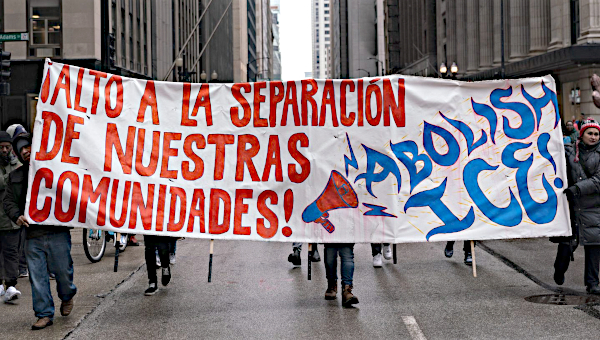From MRZine. Some reflections by Samir Amin, one of our favorite radical writers and thinkers. This piece was written in March, before the conference.
1. The title of this note is intentional. Over the past twenty years, the Western powers in a military alliance (NATO) have arrogantly cast themselves as representatives of the "international community" and thus marginalized the United Nations, the only institution qualified to speak in its name.
This attitude is now systematic, and, in all international conferences, the NATO powers constitute a separate group, often to collectively oppose the others, "the rest of the world"!
It's no accident that the preferred tool of the group of the nations in question is a military alliance. It reflects the real existence of a collective strategy of the group, a strategy through which the real objectives of this new form of imperialism, which I have called "collective imperialism," are expressed. The real world is divided between dominant powers and dominated countries, and the former, to remain dominant, must preserve access to natural resources of the entire planet for their exclusive profit, and the military control by the armed forces of the United States and its subaltern NATO allies has become the essential means for that purpose.
2. The real objectives of new collective imperialism obviously cannot be admitted. To hide them, the powers in question have decided to exploit the discourse of democracy and human rights to their benefit.
Therefore, the diplomacy of the Triad (the United States, Europe, and Japan) paints a world divided between democratic and undemocratic countries. The democracies (NATO powers) demand a "right to intervene" to promote the progress of democracy and uphold human rights, which are violated here and there by barbaric dictatorships. Some even speak of a "duty to intervene."
3. The agenda of the United Nations scheduled a series of major international conferences to clarify the important choices to be made for the 21st century, one of which concerned the problems of "all forms of racism and discrimination." The format of these conferences included a meeting meant to represent "civil society" held in parallel with a meeting of representatives of governments.
The first conference on racism was held in Durban in September 2001, just days before the 11 September attacks that year.
A second conference is scheduled for April 2009. Although it is to be held in Geneva, it is called "Durban 2."
4. Durban 1 was a double defeat for the NATO powers precisely because their maneuver was defeated both by the majority of governments of the South at their conference and by the Civil Society Forum.
In the framework of their conference, the governments of most countries defended the principles of international law that prohibit any unilateral foreign intervention under any pretext. History has taught them the real reasons for these interventions and the hypocrisy of the discourse of the "civilizing mission," now called "defense of human rights." What has happened since Durban 1 confirms the wisdom of their refusal. The Charter of the United Nations, which authorizes foreign interventions only with the consent of the Security Council and which strictly restricts their scope and duration, has been systematically violated by the NATO powers, which have granted themselves the right to unilaterally decide to pursue their interventions. After the invasion of Iraq, under the pretexts that now everyone knows were completely false, one understands why the NATO powers fear a new "defeat" at Durban 2.
The Civil Society Forum held on the occasion of Durban 1 also condemned the principle of foreign interventions in the affairs of the countries of the South. But it by no means renounced the idea of denouncing crimes committed by governments in the South against their peoples. The forum did not contest the perfect legitimacy of campaigns organized to denounce these crimes and never said that the support of the peoples of the North for these common struggles for democracy was undesirable. However, the forum rightly refused to confuse necessary expressions of international solidarity of peoples with unilateral decisions to intervene made by the governments of the North! One cannot blame them. Through their experience of history, the peoples of the South know that imperialist domination has always been a major obstacle to democracy. They know that the reason invoked to legitimize interventions -- the "defense of democracy" -- has never been brought up unless the planned interventions served the real objectives of imperialist domination. The peoples of the South must themselves take up their struggle for liberation, democracy, and social progress.
The NATO powers, after Durban 1, questioned whether the Civil Society Forum was "representative." Certainly, the format of these forums, which bring together many organizations from a variety of schools of thought, remains a subject of necessary critical reflection. And the format to ensure "authentic representation" of peoples remains difficult to define. Nevertheless, the forum at Durban 1 was certainly no less representative than others, especially those forums of NGOs hand-picked by some international institutions like the World Bank!
The institutionalization of appropriate forms of representation of peoples, designed to strengthen the legitimacy of the United Nations rather than weaken it, surely constitutes a goal that must be pursued. Discussion and proposals for action in this direction should be put on the agenda of Social Forums and all democratic and progressive organizations.
For the peoples of the South, Durban 1 was a success. I myself wrote an article along these lines ("World Conference against Racism: A People's Victory," Monthly Review, December 2001). That is precisely the reason why the NATO powers have themselves described it as "failure."
Read the complete article here ...







No comments:
Post a Comment